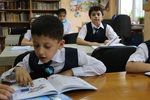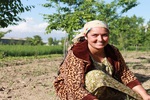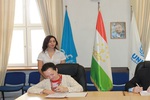Home > News of the Region > News
News

Roundtable on Birth RegistrationUNHCR and Partners organize a Roundtable on Birth Registration in Astana ASTANA, Kazakhstan. May 30, 2017 (UNHCR) - The Office of the United Nations High Commissioner for Refugees and its NGO partner, the Kazakhstan International Bureau for Human Rights and the Rule of Law (KIBHR), jointly organized a Roundtable on Birth Registration and Right to Identity in Astana, Kazakhstan. The Roundtable brought together practitioners from the Ministry of Internal Affairs, the Ministry of Justice, administration and migration department of the Mangystau region, civil society organizations, UNICEF and UNHCR. The Republic of Kazakhstan currently hosts 6,706 stateless persons who are registered by the Government of the Republic of Kazakhstan. However, it is believed that the actual number of people living in the country with invalid, expired, or no documents at all is much higher. In the framework of its global campaign to end statelessness, UNHCR in partnership with KIBHR and the Legal Centre of Women’s Initiatives “Sana Sezim” launched an identification campaign for reaching out to a greater number of “hidden” people enduring generations of statelessness despite their deep-rooted and longstanding ties to Kazakhstan. In 2016, thanks to the efforts of the UNHCR partners, 1,781 persons with undetermined nationality were identified, the majority of whom possessed no proof of identity, and 247 people were able to find a solution to their situation through naturalization or confirmation of citizenship. The Roundtable was preceded by a series of initiatives that had been undertaken jointly with the Government of Kazakhstan to reduce and prevent statelessness, including the country-wide information campaign, field outreach visits to various regions of Kazakhstan, and sensitization workshops for relevant government officials. UNHCR and the government of Kazakhstan also collaborated to undertake participatory assessment with individuals in statelessness situations. The assessment aimed to identify legal problems faced by the individuals in statelessness situations and to find possible solution to these issues. In 2016, a Working Group was established with the participation of the Government of Kazakhstan, civil society, and UNHCR to conduct a comprehensive analysis of the national legislation governing nationality. As a result, a set of recommendations was developed to address the inadequacies of the existing laws. For example, one of the gaps revealed that children born to persons with undetermined nationality, and persons who do not have valid identity documents or lack residence registration, are not registered at birth. The Roundtable discussed international standards of the birth registration and the right to identity. Connection between birth registration and statelessness was also explored. The main findings of the analysis of national legislation were presented, including laws and bylaws preventing children born to undocumented parents from birth registration, and specific provisions which lack safeguards from statelessness. Participants actively exchanged views and shared their experiences to explore how various legal changes would fit into Kazakhstan’s legal system and practice. Towards its goal of eliminating statelessness, UNHCR will continue to advocate for every child’s right to birth registration and nationality in cooperation with various partners. The Analysis of the National Legal Framework on Citizenship and Statelessness will serve as a useful tool to work together with key stakeholders, including Parliamentarians and Ombudsperson for the Rights of the Child, for promoting necessary legal reform.
12.06.2017 |

Refugee athletes compete for first time at Asian Games
25.09.2017

Refugee athletes prepare to compete at Asian Games in Turkmenistan, as Opening Ceremony takes place
18.09.2017

UNHCR supports the right of refugees to education
07.09.2017

Sowing Seeds of Hope
24.07.2017

UNHCR and Sheraton Setting Up Innovative Partnership
04.07.2017

The World Refugee Day 2017 in Almaty
29.06.2017

Reaching Out to Youth
16.06.2017

UNHCR at EXPO-2017 Astana
14.06.2017

»» Roundtable on Birth Registration
12.06.2017

JOINT COMMUNIQUE BETWEEN UNHCR AND UNICEF
02.06.2017


